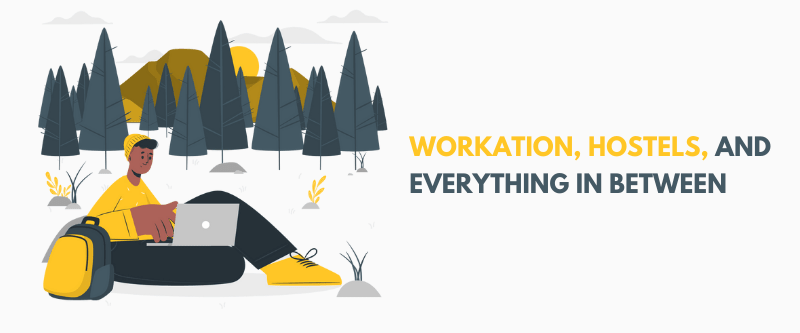The hospitality industry is having a bumpy ride ever since the COVID-19 pandemic started. While many hospitality establishments providers got shut, some managed to stay afloat, and some have recovered fully.
Now, with the Covid-19 graph flattening, people are starting to travel again. But this time, it’s not just the rules, but the travel preferences have changed too.
Similar to staycations and weekend gateways, workations have become increasingly popular among travellers.
It’s not just the hotels that are turning to workations; hostels are also adopting this trend, especially to cater to those digital nomads who wanted to get away from the city hustle-bustle.
To learn more about the workation trend, we talked to two experts from the industry — Pranav Dangi, Founder and CEO at The Hosteller, and Darshan Bora, Sales and Revenue Manager at goSTOPS.
During the interaction, Dangi and Bora have shed light on a lot of interesting aspects. If you’re a hospitality enthusiast, this article is the best thing since sliced bread.
Before we jump to the interaction part, let me first give you a quick explanation of ‘what is workation’.
Table of Content
What is Workation?
A workation is exactly how it sounds; it is work + vacation. Simply put, it is about staying in a place for long, feeling the local essence, and getting any work or project done.
If you can’t take a vacation because of work, take the work along with you. Now you can write those marketing copies or send emails while sipping on a passion fruit punch by the pool.
Further, during workation, travellers usually keep certain things in mind.
- Keep their expenditure low
- Travel light
- Stick to a location for a good amount of time
- Try to experience road karma
The Rise of Workation
The pandemic has significantly changed how people work. Numerous companies around the world have turned to the WFH regime and no doubt, this has in turn been a boon for us.
However, there are repercussions; it is taking a toll on productivity and mental health. Therefore, people are now inclined towards vacationing and working at the same time. And that’s how the workation trend came into the picture.
“The real cause behind increased accommodations is the will in the youth to explore and stimulate the lost human connection in the pandemic. The need to connect with like-minded people and relieve stress leads to escape in the name of work away from home,” said Bora.
“Sitting at home in a pandemic and working within four walls of the home has hit like a saddening wave to many people which affected their mental health as well.”
Furthermore, he’s also addressed the concerns of students and young professionals. Bora feels that home isn’t always a conducive place to work and study. With family members constantly around, it’s not always easy for everyone, which is definitely a significant factor.
“People require enough space; a healthy and stimulating environment to work, study or just function normally,” Bora added.
While Bora was explaining the reason behind workation becoming popular, Dangi also pitched in and seconded.
“To be honest, people are tired of WFH and the same is affecting their efficiency, mental health and making them less productive at work. However, since the time people were allowed to move out, WFH has converted into Work from Anywhere (WFA),” said Dangi.
“The freedom to travel alongside working with different landscapes and views is quite enticing. Plus, the hospitality industry has been adapting to make themselves more aligned with the trend.”
What Role Hostels are Playing?
While both the experts were covering all the aspects already, I was keen to know about the roles of hostels. Because I am sure, a trend like workation cannot be limited to regular accommodation providers.
So, when asked about the same, Bora said that the workation trend in the hospitality industry has aided hostels in accommodating long stays (for weeks and months) with affordable prices. Hostels are now exploring this trend with an open mind; and as a result, they are able to attract youth at a large scale.
The Hosteller’s CEO also agreed and explained further.
Hostels, though operating on a lean model, were hit no differently than anyone else in the industry. However, according to Dangi, it was sort of a breather for hostels.
If you look closely, you’ll see that the hostel segment has done some pretty good innovation, leading to developing services like Workation. Many hostels even upgraded their infrastructure to make it suitable for people coming to stay for a longer duration.
And, one way or the other, it has worked out for hostels. They are today, a vital player in the workation arena.
“You can take our example. Today, almost 50% of the inventory under the brand is filled by people coming for workation,” emphasized Dangi.
Over and above, he also said that even their branding has been – Why WFH when you can work from anywhere.
“A good Wi-Fi network, a clean/hygienic place to stay, easy meal options, and a vibing environment to chill on the weekends/work-offs is all that a person seeking workation needs,” Dangi added. “And The Hosteller got all of it, making us an ideal place for workation.”
The Technological Aspect of the Workation Trend
Adapting to a trend is one thing, but there are a few other important things that go behind the scene. If you want your operations to be seamless, you need much more than just a PMS.
Your property must have a solution that automates mundane tasks.
Now, while there are several solutions in the market, nothing comes closer to eZee. However, you might still be wondering whether we actually walk the talk.
So, when I asked Dangi and Bora about their tech preference, both of them settled on the same page as well.
“eZee, as I have mentioned countless times earlier, is our backbone. The tech capabilities that we get from eZee enables us to roll out or customize products quickly,” said Bora.
“goSTOPS and eZee Technosys have been partners for more than 5 years now and our strong partnership has been nothing but fruitful to us,” said Dangi “eZee has supported us in implementing a new strategy for inventory and pricing for workation. Not only this, but they also have been a guiding light in integrating with new channels which have resulted in building a smooth workation experience for our guests.”
Technology is crucial and we have realized it the hard way. If you are tapping on a new trend or planning to tweak your business to make the most of an opportunity, you need to have a robust tech stack.
We also have a guide that will help you pick the best software for your property. Do give it a read.

Breathing New Life into Hostels
Hostels have struggled then; they are struggling now. It seems to be a never-ending tunnel. However, there’s a ray of hope.
The vaccination is taking place to a good degree. People are stepping out of their homes to continue globetrotting with new travel trends.
The insights from Dangi and Bora are gold and speak volumes about hostels making the most out of a trend. Not to mention, this also shows that the industry is supremely agile.
Talking about the future, Dangi believes that the workation trend will continue till the end of 2022, at least. And Gen Z will be the core segment.
Now, if you ask about my opinion, my money is on both of their takes. I was on a workation a couple of weeks ago and can’t emphasize how refreshing it feels. I could see how desperate people are to relax and work.
WFH is absolutely doable, but it needs a change at times. I am sure, hostels that are up the creek will tap into workation because it is, indeed, breathing a new life.



